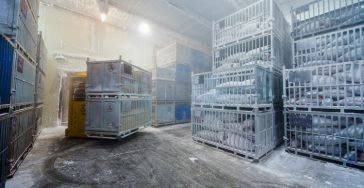- HOME
- My account
- Our Service
- International Shipping Services
- Domestic Shipping Services
- Customs Clearance Services
- Warehousing & Storage
- Specialized & Value-Added Logistics
- Packing & Packaging Services
- Value-Added Logistics Services
- E-Commerce Logistics Services
- Insurance & Support Services
- Air Transportation Services
- Sea Transportation Services
- Land Transportation Services
- About us
- Contact us
Warehousing & Storage Services
Easycost Logistics offers secure and flexible warehousing and storage solutions designed to support efficient inventory management and uninterrupted supply chain operations. Our facilities are equipped to store a wide range of goods under controlled and well-organized conditions.
We provide short-term and long-term storage options, supported by systematic inventory handling, accurate stock control, and safe loading and unloading processes. Every stored shipment is managed with strict safety standards and operational transparency.

Short-Term & Long-Term Storage

Bonded Warehousing

Cold Storage & Frozen Storage

Goods Receiving & Dispatch

Inventory Management

Packing & Repacking

Consolidation & Deconsolidation

